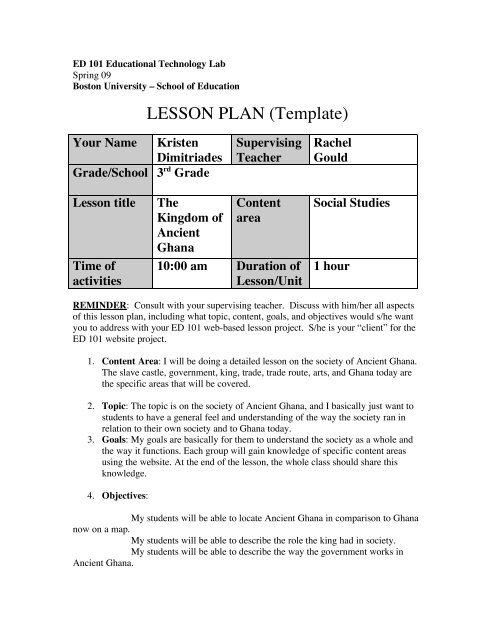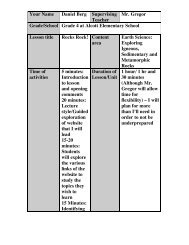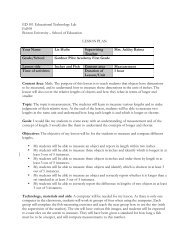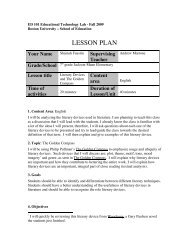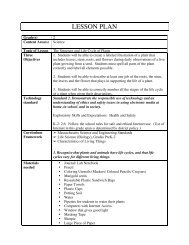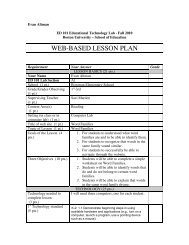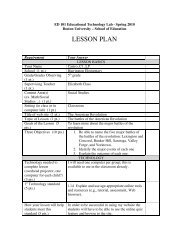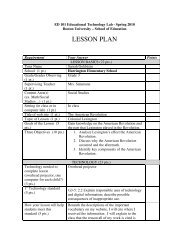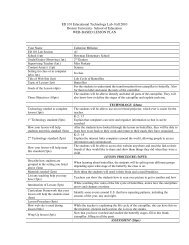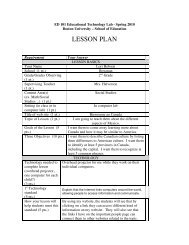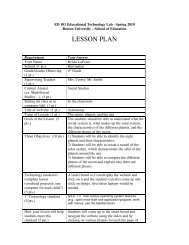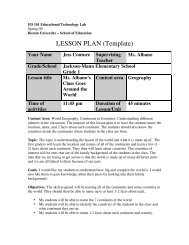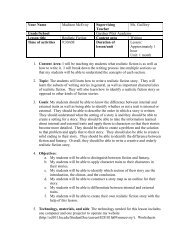LESSON PLAN (Template) - ED101 - Boston University
LESSON PLAN (Template) - ED101 - Boston University
LESSON PLAN (Template) - ED101 - Boston University
Create successful ePaper yourself
Turn your PDF publications into a flip-book with our unique Google optimized e-Paper software.
ED 101 Educational Technology Lab<br />
Spring 09<br />
<strong>Boston</strong> <strong>University</strong> – School of Education<br />
<strong>LESSON</strong> <strong>PLAN</strong> (<strong>Template</strong>)<br />
Your Name Kristen<br />
Dimitriades<br />
Grade/School 3 rd Grade<br />
Supervising<br />
Teacher<br />
Rachel<br />
Gould<br />
Lesson title<br />
Time of<br />
activities<br />
The<br />
Kingdom of<br />
Ancient<br />
Ghana<br />
Content<br />
area<br />
10:00 am Duration of<br />
Lesson/Unit<br />
Social Studies<br />
1 hour<br />
REMINDER: Consult with your supervising teacher. Discuss with him/her all aspects<br />
of this lesson plan, including what topic, content, goals, and objectives would s/he want<br />
you to address with your ED 101 web-based lesson project. S/he is your “client” for the<br />
ED 101 website project.<br />
1. Content Area: I will be doing a detailed lesson on the society of Ancient Ghana.<br />
The slave castle, government, king, trade, trade route, arts, and Ghana today are<br />
the specific areas that will be covered.<br />
2. Topic: The topic is on the society of Ancient Ghana, and I basically just want to<br />
students to have a general feel and understanding of the way the society ran in<br />
relation to their own society and to Ghana today.<br />
3. Goals: My goals are basically for them to understand the society as a whole and<br />
the way it functions. Each group will gain knowledge of specific content areas<br />
using the website. At the end of the lesson, the whole class should share this<br />
knowledge.<br />
4. Objectives:<br />
My students will be able to locate Ancient Ghana in comparison to Ghana<br />
now on a map.<br />
My students will be able to describe the role the king had in society.<br />
My students will be able to describe the way the government works in<br />
Ancient Ghana.
My students will be able to talk intelligently and with feeling about the<br />
slave trade of Ancient Ghana.<br />
My students will be able to identify some of the goods and crops that<br />
Ancient Ghana traded, with who, and how this benefited their society.<br />
My students will be able to identify the trade route used by Ancient Ghana<br />
and how it ran.<br />
My students will be able to identify some of the crafts that were made in<br />
Ancient Ghana and what they were used for.<br />
My students will be able to compare everything they have learned with the<br />
way Ghana is today.<br />
5. Technology, materials and aids: The main technology of my lesson will be my<br />
website open on computers. I will try to have enough so that groups of 3 students<br />
can share a computer (6 computers in all). However, if this isn’t possible I can<br />
have 2 groups share computers, or rotate the class to one computer while another<br />
lesson is being taught. I will have students using the whiteboard and whiteboard<br />
markers to help them present.<br />
6. Procedures/methods:<br />
a. Overview: I will introduce the topic of Ancient Ghana and then have<br />
students split into groups of 3 and assign them a specific topic. They will<br />
then all go to separate computers and research their topic using my<br />
website. They will have about 10-15 minutes for this and be able to<br />
discuss amongst themselves, with my help, how they will present their<br />
information to the class. My website will be used mainly as a research tool<br />
for the class, so that they do not need to search the whole Internet for<br />
information, which would be much more time-consuming and runs the<br />
risk of misinformation.<br />
b. Introduction: I will introduce Ancient Ghana by asking students about<br />
any other ancient societies they know of and how long ago they think<br />
Ancient Ghana existed. I will then show them pictures of Ancient Ghana,<br />
found on my home page.<br />
c. Activities:<br />
d. Introduction:<br />
e. -State that we are going to be researching the society of Ancient<br />
Ghana and ask if they know of any other ancient societies<br />
f. -Ask, based on the word ancient, how old they think this society<br />
might be.<br />
g. -Have the students look at the computer, and explain to them the<br />
concept of a main page<br />
h. -Show them the pictures on the home page and explain that this is<br />
the society they will be learning about
i. -Show them the links along the side and tell them that this is where<br />
they will find the information they need to prepare their lesson, explain the<br />
assignment and that they will have 10-15 minutes to learn their<br />
information and decide how they will share it with the class<br />
j. Researching:<br />
k. -Students will be divided into groups and sent to their respective<br />
computers to research their topics<br />
l. -I will walk around the classroom making sure that everyone is on<br />
the topic they are supposed to be and answering any questions<br />
m. -After time is up I will have the students return to their seats with<br />
their groups<br />
n. Presentation:<br />
o. -One at a time I will have the groups come up to present in the<br />
same order that the information is presented on the website<br />
p. -I will ask them to talk about how they liked or didn’t like using<br />
the internet for research in addition to talking about their topic<br />
q. -They will be allowed to use the whiteboard if they wish to in<br />
order to teach their lesson<br />
r. -Their will be a short question and answer after each group goes so<br />
that the students can ask any questions that came up during the<br />
presentations<br />
s. Follow up: There will be a homework assignment with a map for the<br />
students to color in to label where current Ghana and Ancient Ghana are.<br />
Underneath they will be asked to write a short paragraph about the most<br />
interesting thing they have learned in today’s lesson.<br />
Technology Frameworks:<br />
G3-5: 1.14 Explain and use age-appropriate online tools and resources (e.g., tutorial,<br />
assessment, Web<br />
browser).<br />
G3-5: 3.3 Evaluate Internet resources in terms of their usefulness for research.<br />
G3-5: 2.5 Work collaboratively online with other students under teacher supervision.<br />
Blooms Taxonomy of Cognitive Learning and Assessment<br />
Objectives:<br />
My students will be able to locate Ancient Ghana in comparison to Ghana<br />
now on a map. Cognitive: knowledge, Affective: receiving phenomena<br />
This will be assessed when the geography group is teaching the class. I will ask them to<br />
physically locate both on a map.<br />
My students will be able to describe the role the king had in society.<br />
Cognitive: knowledge, Affective: receiving phenomena, Psychomotor: perception<br />
This will be assessed in the multiple-choice assessment, and also by the summary the<br />
king group gives to the class.<br />
My students will be able to describe the way the government works in<br />
Ancient Ghana. Cognitive: knowledge, Affective: receiving phenomena
This will be assessed in the multiple-choice assessment and also in the student<br />
presentation.<br />
My students will be able to talk intelligently and with feeling about the<br />
slave trade of Ancient Ghana. Cognitive: comprehension,<br />
This will be assessed through a discussion about the video on the web site led by the<br />
group assigned this topic.<br />
My students will be able to identify some of the goods and crops that<br />
Ancient Ghana traded, with who, and how this benefited their society.<br />
Cognitive: analysis, Affective: receiving phenomena, Psychomotor: perception<br />
This will be assessed in the multiple-choice assessment and also through the group<br />
presentation.<br />
My students will be able to identify the trade route used by Ancient Ghana<br />
and how it ran.<br />
Cognitive: analysis, Affective: receiving phenomena, Psychomotor: perception<br />
This will be assessed through the presentation and how well the students are able to draw<br />
this route on the board during the presentation.<br />
My students will be able to identify some of the crafts that were made in<br />
Ancient Ghana and what they were used for.<br />
Cognitive: analysis, Affective: receiving phenomena, Psychomotor: perception<br />
This will be assessed in the multiple-choice assessment and also through the student<br />
presentation.<br />
My students will be able to compare everything they have learned with the<br />
way Ghana is today.<br />
Cognitive: analysis, evaluation, Affective: evaluation<br />
This will be assessed through the closing discussion of the topic.<br />
Web Based Assessment<br />
1. What is one of the main things the kind did to protect his people?<br />
a. teach the traders other languages<br />
b. charge people entering and leaving Ghana a tax<br />
c. allow traders to enter his city on a routine basis<br />
2. What type of government did Ancient Ghana have the longest?<br />
a. multiparty system<br />
b. military system<br />
c. one party system<br />
3. What is something that traders could pay tax in?<br />
a. salt<br />
b. money<br />
c. gold<br />
4. What did Ancient Ghana have an abundance of?<br />
a. peacock feathers<br />
b. iron<br />
c. gold<br />
5. Why do adults in Ancient Ghana sometimes wear masks?
Answer Key<br />
1. b.<br />
2. b.<br />
3. a.<br />
4. c.<br />
5. c.<br />
a. to play make-believe<br />
b. to scare children<br />
c. to celebrate special occasions at masquerades


